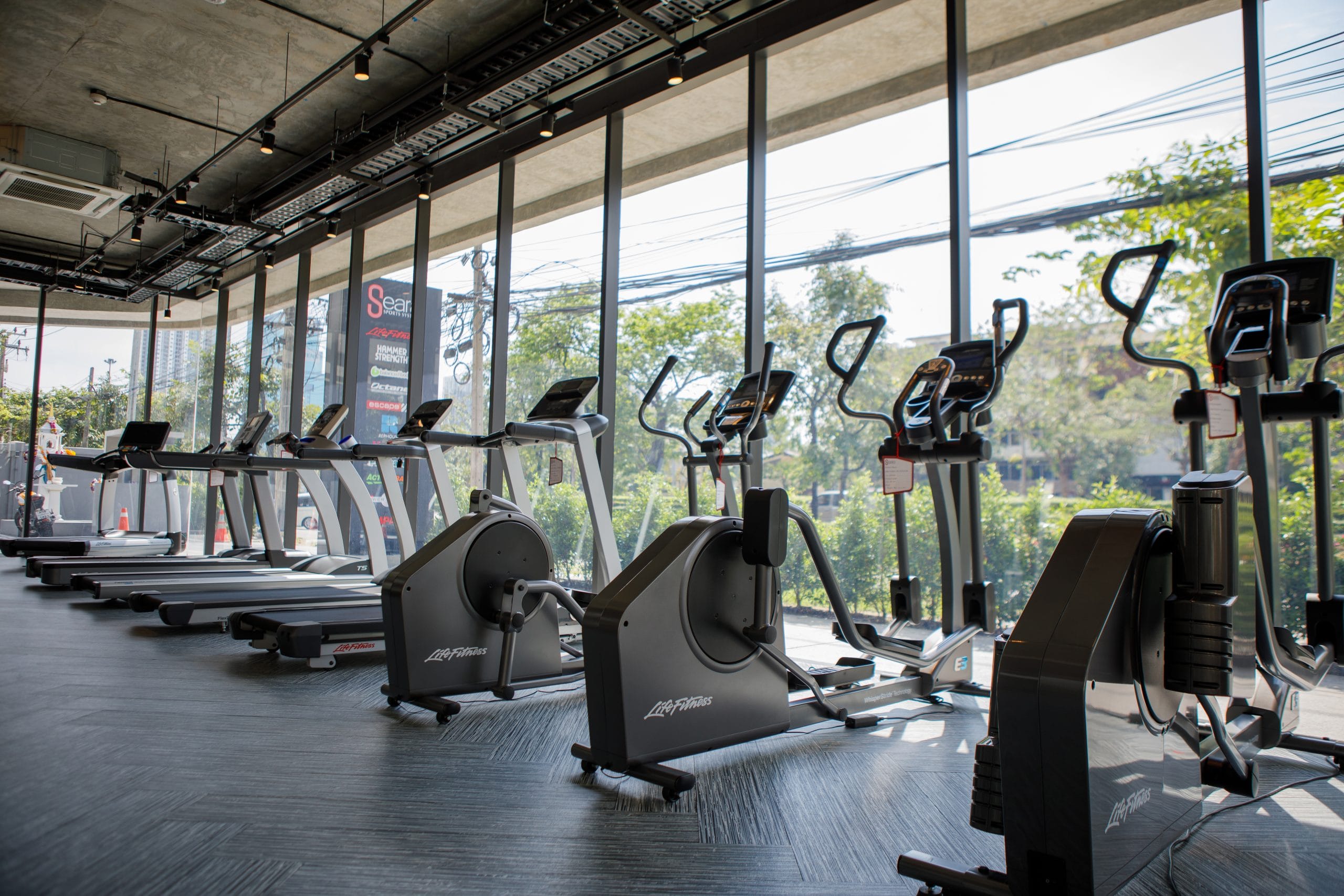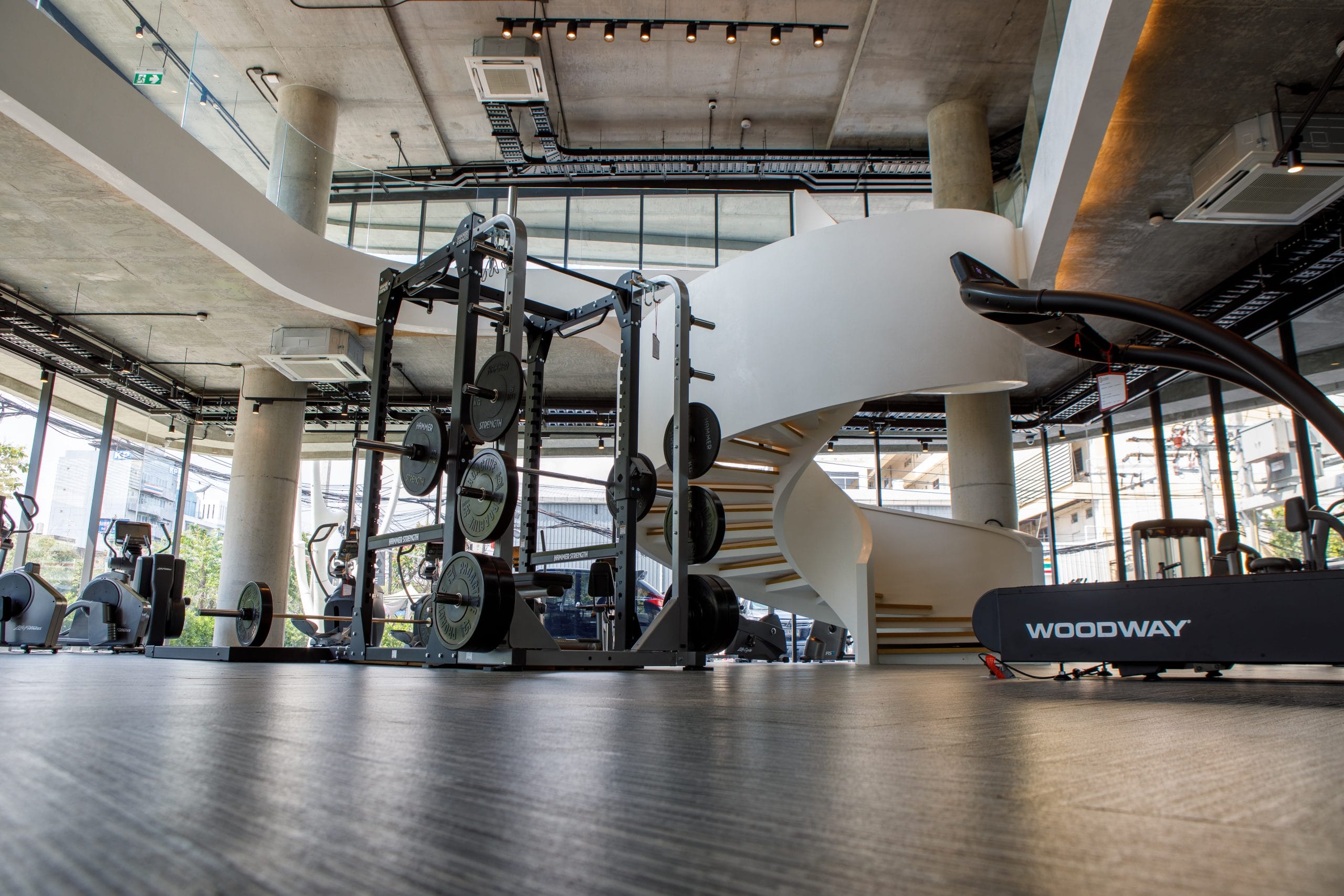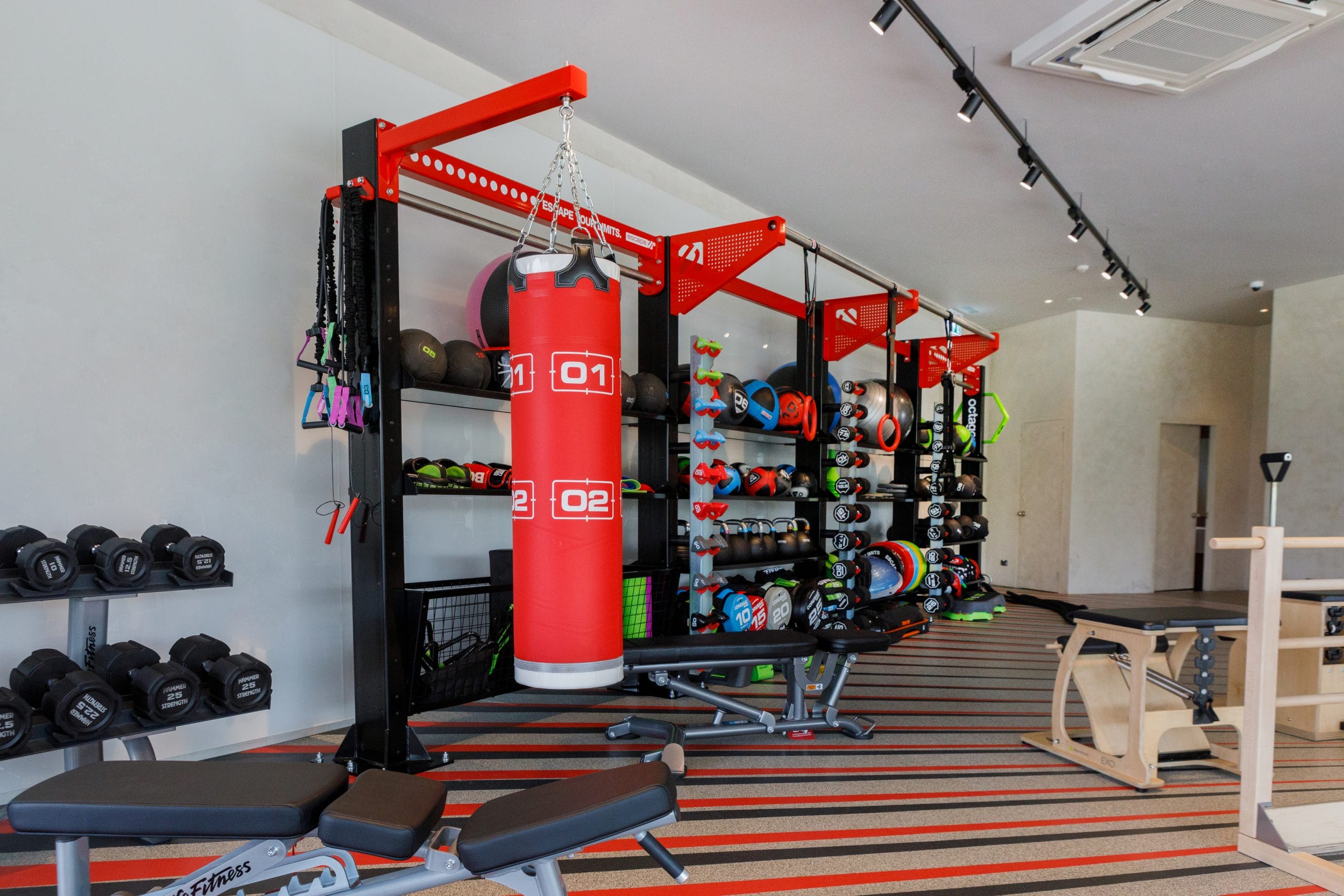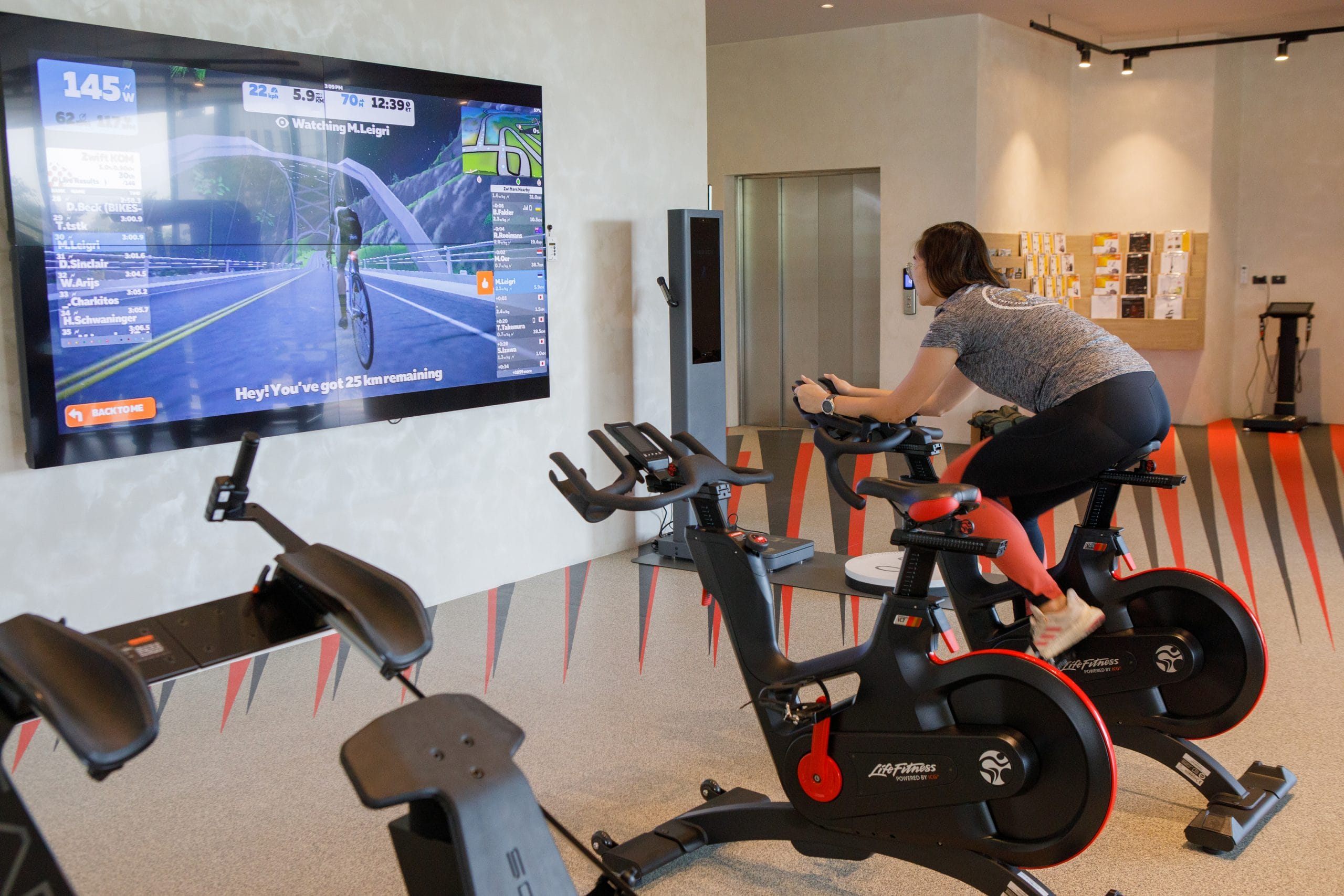They craft personalised solutions that work out, for any space or market sector.
By Aiden Jewelle Gonzales
“When it comes to fitness or wellness, we want to engage with the lifestyle of people,” Sutouch Vongsuksiri, the Director of Sales and Business Development of SEARA Sports Systems tells me at their flagship showroom in Bangkok. “It’s like hotels, hospitals, or gyms – at the end of the day, they’re selling more than just memberships or products, they’re selling experiences.” And indeed, though their expansive showroom only offered a glimpse of some of the services they offer, the range is breathtaking – from state-of-the- art gym equipment, to Pilates reformers and accessories, to outsized foosball tables and meticulously-designed pool tables crafted out of wood.
“We are not simply a trading company selling steel products and specialty sports surfacing. Nor are we an authorised distributor focused solely on a single brand,” SEARA’s Executive Director, George Foose, chimes in. “We are both horizontally and vertically integrated into how various industries utilise fitness, sports, athletics, and recreation in their business.”
Established in 1999, SEARA began in Bangkok as company focused on “planning, supplying, and building Asia’s recreational infrastructure,” partnering with some of the best and most renowned brands in sports and fitness in the world. With offices in eight countries in Indochina and East Asia, SEARA prides itself on being different from other distributors of fitness equipment, offering their consulting services from the ground up in several projects. “Most distributors will simply provide a list of equipment and make a quotation,” Sutouch tells me. “But the way we work, we start at the feasibility study level in some projects, talking to owners about their ROI, how to market their product and differentiate themselves, space planning, interior design, and architecture. We’re engaged from the very start.”
With SEARA from its conception, George has brought his immense “knowledge about the application of sports and recreational amenities to the hospitality and real estate industries” to the company, having gained a wealth of experience in various geographies – in Singapore, Kuala Lumpur, and Hong Kong – and as the Director of Marketing of Club Corporation of Asia for over a decade. For him, SEARA stands out because of its focus on “international standard facilities” and its ability to “recommend appropriate solutions for the brand or market position of the customer” based on the team’s experience, compared to the price-based model of their competitors.
Sutouch, on the other hand, started his career in wellness at an anti-ageing clinic before moving to the fitness industry, which he feels “engages people more and encourages them to live healthier.” He believes that SEARA’s USPs are obvious: “we can target teenagers who want to do HIIT-style training, senior people who do rehabilitation, ladies who love Pilates, and athletes who are very performance-oriented. It’s impossible to have just one product and one brand and serve all our target groups, and that’s a key differentiation of SEARA,” he explains.
Both Sutouch and George speak further to Masala on the range of premium services and products offered at SEARA, and their transformative fitness solutions for various industries.
You have a broad range of products and services that you provide to many commercial market sectors, as well as individual users. Can you walk us through the services and solutions you offer?
George: We work with architects, developers, consultants, and owners in the areas of design and planning, budgets, and financial and operational appropriateness for the scale of the project. We are passionate about what we do and refuse to have our products and services viewed as a commodity.
Sutouch: At SEARA we have to be good in all market sectors. For example, we have residential projects like condominiums which have a limited gym size that has to serve a lot of people; and hospitality partners, from resorts to flagship hotels in central Bangkok.
We also provide services to hospitals, ranging from equipment for the orthopaedic department, to the rehabilitation department, to the sports department; and we make sure that our staff have the capability to talk about medical specifications with doctors. We also service largescale fitness centres, providing consultations on how to manage the space for a wide range of demographics, and how to operate efficiently; as well as sports construction, including running tracks, soccer fields, tennis courts, etc.
They all have different styles, and serve different groups of people. The challenge is to provide a service design that matches with that brand identity. It’s about branding, experience, and atmosphere. Every market sector has its own challenge and here at SEARA, we can meet that challenge because of the cumulative experience of all our specialists in different fields.
You are also the official distributor for many world-renowned brands. Can you tell us about those partnerships, and why they’ve chosen SEARA as theirofficial distributor?
George: From the beginning our business model has not changed. We have always seen our markets as commercial fitness, retail or home fitness, a complete variety of sports construction skills, and customer service. One of our longest-term partners is Life Fitness. We are their oldest distributor in the Asia Pacific region, and we have had this relationship since 1991. Many of the specialty sports surfacing and fitness suppliers we represent actually sought us out. We don’t collect ‘clocks on a wall,’ but look for quality products that add value to our portfolio, have a customer service organisation, and satisfy our customers.
Sutouch: Aside from Life Fitness, which is a world-recognised brand, we also distribute Hammer Strength, the best brand for athletic training, and most often used for NBA and NFL team training equipment; PsyFit, equipment that’s been certified as a Class 2 medical device, designed for doctors or physiotherapists; Balanced Body, the best Pilates equipment brand in the world; and Plexipave, basically the world-standard brand for tennis court surfacing, at a competition level.
You’ve also partnered with many in the hospitality sector. Can you tell us a little about that, and the unique solutions you provide?
George: We operate in eight countries, and the hospitality industry tends to be our second largest market segment. In many developing markets, the hospitality industry is one of the few market sectors that has positioned international standard products as their brand standard. The known international brands have always done this, but local brands may have an incubation period that matures before other segments in society. This is why the hospitality industry is important. In developing markets, it pre-stages residential real estate. We focus on the hospitality industry by having local branches, quality products, and well supported customer service.
Sutouch: Each of our hotel partners may want something different, and SEARA provides the whole service and design, including preventative maintenance. Some hotel gyms are designed to just serve the guests, while some hotels may want to expand their service to outside people. There are some that are more focused on recreational activities or a family-friendly space, or some have a specific vision for the design of the gym. For the latter, we’ve done everything from matching the colour, to the floor markings, to the equipment itself, to make sure it fits in with the identity of the brand. And this is not even five percent of what we’ve done.
Tell us about how SEARA has changed the home workout space with their more exciting products for home and personal use.
George: We opened our first showroom on Thong Lor because we made the decision to seriously cater to the boutique or premium home fitness market; the B2C market. Home fitness is a huge market dominated by impulse buyers of low-end products on TV or online, similar products in department stores, or price- driven importers of contract-manufactured Chinese products.
Commercial fitness products and home fitness products are not the same. Few brands or manufacturers design and develop purpose- made quality home fitness equipment. This level is commonly found in boutique specialty stores like our showrooms. We have found that people who visit our showrooms do not mistake us for department stores – they want quality, B2B-standard products; responsive customer service; and the option to trade in when they want to change.
Sutouch: Home gyms are very personalised – I have one myself, designed for my needs. Our home gyms are designed to serve the needs of one or two people only. If a person chooses to get a consultation from us, it means that they want something outstanding and distinctive. At the same time, they want it to serve their training style. Our individual clients are often top athletes, celebrities, and actors, but we also have clients who are just normal people, and we have a wide variety of products and brands that can serve them all.
You’ve also ventured into the Pilates space. Can you elaborate on that?
George: We have been the regional representative of Balanced Body for over twelve years. This is a natural product extension for us, as Pilates is a cross over between commercial and consumer fitness. We are fortunate that our Hospitality Sales Manager, Khun Pam, is a passionate student of Pilates. In this product category, your customers always know more than you. Pilates is a close-knit community and takes years of study.
Sutouch: Pilates is getting more and more popular in Thailand. It’s not just a gentle and controlled exercise, it’s now considered a lifestyle. We don’t only provide reformers, but different apparatus as well. Being a representative of Balanced Body, our staff had to be capable of not only introducing the products but how to use them and their benefits, and thus we’ve partnered with Fitness Innovation, which allows them to gain the certification to become Pilates instructors, after over 100 hours of classes and training.
How is SEARA integrating cutting-edge technology into their products and services?
George: Technology on the consumer side of fitness revolves around wearable devises and apps that may cross the boundaries between fad and fashion. There are now over 72,000 fitness apps! SEARA is expanding our technology offering to customers who wish to provide their customers or members specialised or advanced services. In addition to the science of recovery, or the blending of gaming and fitness, we are providing evidence-based 3D motion analysis and 3D body scanning, and metabolic analyses to commercial customers.
Sutouch: Not only is wearable technology the current top fitness trend, but we’ve also found that Virtual Reality (VR) is moving from gamification to the fitness space. Being a consultant from B2B to B2C, we have to ensure that we have equipment that can link to our customers’ wearable devices, and applications that can link to a wide variety of fitness apps. We connect everything to one complete ecosystem, where the data is synchronised, the UX/UI is seamless, and you have the best user experience. That’s the first aspect of being a provider of fitness technology.
Another is performance tracking. We have the capability to design applications tailor-made for clients, and we’ve provided brand-new technology that focuses on fitness livestreaming, tracking, and other solutions.
What are SEARA’s expansion plans?
George: Firstly, completing our new corporate headquarters and new concept showroom in Bangkok during the Covid pandemic was something that we are proud of completing. This year, we are opening a new branch with full showroom in Hat Yai, as well as a showroom in Hanoi, Vietnam. We are also looking at our new e-commerce store and our supply chains to work together with our bricks and mortar branches to move from being a linear to an omni-channel organisation.
Sutouch: It is not just the number of branches, but also the market sectors that we’re entering. This year, we’re doing a lot of government projects, and we’re also working closely with many universities, in educational projects. It’s not just the number of branches, but the depth and width of the target group as well.










